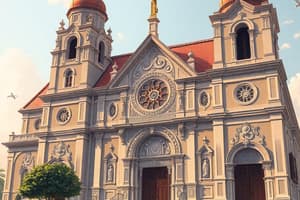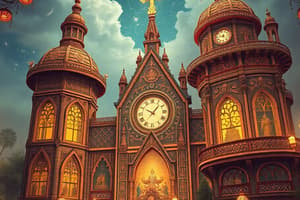Podcast
Questions and Answers
What is the goal of the Liturgy of the Hours?
What is the goal of the Liturgy of the Hours?
The Liturgy of the Hours aims to divide the day into seven units and purify each unit through praise and worship.
What are the key components of the Paschal Mystery?
What are the key components of the Paschal Mystery?
The Paschal Mystery encompasses the blessed Passion, death, Resurrection, and Ascension of Jesus to heaven. It's the salvific work of Christ for the redemption of humanity.
What are the purposes of the sacraments?
What are the purposes of the sacraments?
The purposes of the sacraments are to sanctify humans, build up the Body of Christ, and ultimately, to give worship to God.
What is the difference between sacraments and sacramentals?
What is the difference between sacraments and sacramentals?
Why are sacraments administered in different ways?
Why are sacraments administered in different ways?
What is the difference between devotions and rituals?
What is the difference between devotions and rituals?
What are the objectives of feasts in the church?
What are the objectives of feasts in the church?
Which of these is NOT a Feast of the Lord in the Catholic Church?
Which of these is NOT a Feast of the Lord in the Catholic Church?
The sacraments operate primarily by the righteousness of either the celebrant or the recipient.
The sacraments operate primarily by the righteousness of either the celebrant or the recipient.
The author suggests that there is no need to actively participate in the liturgy of the Church.
The author suggests that there is no need to actively participate in the liturgy of the Church.
Flashcards
Liturgy
Liturgy
The central act of Christian worship, where the Church commemorates the mystery of Jesus Christ, involving sacraments, sacramentals, devotions, and rituals.
Paschal Mystery
Paschal Mystery
The salvific work of Jesus Christ, encompassing his passion, death, resurrection, and ascension. This is the central event of Christian faith, celebrated in the liturgy.
Mysteries of Christ
Mysteries of Christ
The preparation for Jesus' arrival, his two phases of life (hidden and public), his suffering, death, resurrection, ascension, and second coming.
Liturgy of the Hours
Liturgy of the Hours
Signup and view all the flashcards
Sacramentals
Sacramentals
Signup and view all the flashcards
Sacraments
Sacraments
Signup and view all the flashcards
Domains of Celebration of the Liturgy
Domains of Celebration of the Liturgy
Signup and view all the flashcards
Advent
Advent
Signup and view all the flashcards
Christmastime
Christmastime
Signup and view all the flashcards
Ordinary Time
Ordinary Time
Signup and view all the flashcards
Lent
Lent
Signup and view all the flashcards
Easter
Easter
Signup and view all the flashcards
Easter Season
Easter Season
Signup and view all the flashcards
Ordinary Time
Ordinary Time
Signup and view all the flashcards
Baptism
Baptism
Signup and view all the flashcards
Chrismation
Chrismation
Signup and view all the flashcards
Holy Qurbana
Holy Qurbana
Signup and view all the flashcards
Reconciliation
Reconciliation
Signup and view all the flashcards
Anointing of the Sick
Anointing of the Sick
Signup and view all the flashcards
Holy Orders
Holy Orders
Signup and view all the flashcards
Holy Matrimony
Holy Matrimony
Signup and view all the flashcards
Evening Prayer
Evening Prayer
Signup and view all the flashcards
Night Prayer
Night Prayer
Signup and view all the flashcards
Midnight Prayer
Midnight Prayer
Signup and view all the flashcards
Early Morning Prayer
Early Morning Prayer
Signup and view all the flashcards
Morning Prayer
Morning Prayer
Signup and view all the flashcards
Forenoon Prayer
Forenoon Prayer
Signup and view all the flashcards
Noon Prayer
Noon Prayer
Signup and view all the flashcards
Devotions
Devotions
Signup and view all the flashcards
Rituals
Rituals
Signup and view all the flashcards
Festal Celebrations
Festal Celebrations
Signup and view all the flashcards
Study Notes
Chapter 4: Christian Life: Celebration of Faith
- The liturgical calendar of the Syro-Malabar Church outlines various periods and feasts, including Advent, Lent, Easter
- Worshipping God is the central aspect of Christian life, and liturgy is the primary form of worship in the Church
- The Church commemorates the divine mysteries of Jesus through sacraments
- Sacraments, instituted by Jesus, and sacramentals, instituted by the Church, are established forms of worship
- God desires everyone to be saved and come to know the truth (1 Timothy 2:4)
- The Paschal Mystery represents the salvific work of Jesus, including his passion, death, resurrection, and ascension, which is central to Christian faith
- The mysteries of Christ include his preparation, hidden and public phases, suffering, death, resurrection, ascension, and second coming
- Liturgy is the public service for the people of God, the work of God, Christ's continuous work of redemption
- The twelve doctrines of faith (Apostles' Creed) are proclaimed and celebrated during the liturgy, which is the highest form of Christian celebration
- Sacraments: essential rituals in Christian faith (Baptism, Confirmation, Eucharist, Reconciliation, Anointing of the Sick, Holy Orders, Matrimony)
- Sacramentals: additional practices, reinforcing sacraments (Blessing of articles, Exorcism, Funeral services)
- The Liturgy of the Hours, a structured daily cycle of prayers and worship, is meant to sanctify different hours of a day
- Popular piety (devotions and rituals) plays an important part in liturgical celebrations
Feasts in the Church
- Feasts are categorized by significance (feasts of the Lord, solemn feasts, and ordinary feasts)
- Key feasts include Christmas, Epiphany, Presentation of Jesus, Palm Sunday, Maundy Thursday, Good Friday, and Easter (etc).
- Some solemn feasts are dedicated to the Blessed Virgin Mary, and to saints
- Ordinary feasts vary across different traditions
Sacraments Administered in Different Ways
- Sacraments, while having a common structure, may differ in form across liturgical traditions (e.g., Holy Qurbana)
- The efficacy of a sacrament depends on the recipient's readiness and the celebrant's attitude
- The criterion for unity in diverse liturgical traditions is adherence to Apostolic traditions
Popular Piety
- Devotions and rituals are important facets of popular piety and can include observing Lent, honoring relics, participating in pilgrimages
- Acts of devotion help in deepening understanding of Christ's life, death, and resurrection
- Rituals are specific practices associated with birth and death in the Church, with a blend of religious faith and regional culture
- Ceremonies and observances for the deceased include prayers, sacrifices, and commemoration during significant periods like 7th day, 40th day, anniversary prayers etc.
Studying That Suits You
Use AI to generate personalized quizzes and flashcards to suit your learning preferences.





